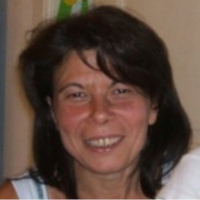
Lorena Perrone attained a Bachelor's Degree in Biological Sciences at the University of Trieste and a Ph.D. in Cellular and Molecular Biology and Pathology at the University of Naples Federico II under the direction of Prof. Roberto Di Lauro. In 2019, she attained the national scientific qualification of second level professor in the following areas: BIOS-07/A (biochemistry); BIOS-08/A (molecular biology); BIOS-09/A (clinical biochemistry and clinical molecular biology): BIOS-13/A (histology and embryology). She performed integrative teaching in general biology courses (University of Naples Federico II), Epigenetics (University of Trieste); molecular biology (University of Udine). At UMUC Europe, Heidelberg, Germany, she was coordinator and president for courses in: general biology; general biology laboratory; nutrition; human physiology; human physiology laboratory. At the KORE University of Enna, Department of Medicine, Degree Course in Medicine and Surgery, she taught clinical biochemistry module and systematic biochemistry within the framework of the course in laboratory medicine; furthermore, she acted as member of the exam board; exam commissioner for the Biochemistry 1 course.
Her research activity is documented by peer reviewed publications with impact factor in which she serves as group leader and research project manager. She has been funded as principal investigator by the European commission, ANR (French National Research Agency), and French regional funding. She has received 2 awards from the European commission and an award from CEA for translational research and development of advanced diagnostic technologies (Medtech Entrepreneur In Residence). She was founder and CEO of the start-up NanoImmuno sas and scientific advisor of the start-up Caminnov sas. She served as scientific delegate to the OECD (Organization for Economic Cooperation and Development), Directorate of Science, Technology & Innovation, Biotechnology, Nanotechnology and Converging Technologies Sector, Working Group: Better Food and Nutrition for Lifelong Health and Well-being. She was a commissioner for the periodic evaluation of the Free University of Brussels (ULB). She is on the editorial board of Frontiers in Molecular Neuroscience. She has been a science disseminator for the European Commission's H2020 portal and science dissemination initiatives.
Her scientific activity is mainly focused on the study of risk factors for neurodegenerative diseases (Alzheimer's and Huntington's) and the search for new early biomarkers for neurodegenerative diseases. In addition, he is dedicated to the development of new “single cell” diagnostic technologies using microfluidics, technologies useful for early diagnostics of lung diseases, cancers, neurodegenerative diseases
OFFICE HOURS
The professor is available to receive the students at the end of the lessons. However, the students may also request an appointment by email.
